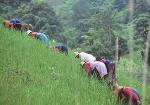Women lead the struggle in Thailand
Published on Tue, 2019-04-02 08:43
Writing from Thailand, Ranee Hassarungsee from the Social Agenda Working Group finds it impossible to constrain the analysis within national borders because “trade liberalization in the process of globalization has enabled transnational corporations to exploit natural resources widely and deeply across borders, in collusion with domestic elites. National-level natural resource policies have implications in other countries as State agencies, domestic monopoly capital and transnational corporations have assumed key roles in framing various aspects of development policies, in manufacturing, energy, environment, land use, etc.” The other side of the coin is that “people’s rights to self-determination is being restricted as their participation in decision-making is curtailed”. In the case of Thailand, “the State has become a joint stakeholder, either as a major shareholder, or the owner of capital itself. When the government is under the absolute control of the military and the people are deprived of their democratic rights to demand accountability, to voice any opinions, not to mention criticism, nor to access information, the problems of natural resource management become even more complicated. Large domestic monopoly capital and corporations that rely on military support are joining hands with foreign corporations to strengthen their access to and control of the country’s resources, thereby creating further injustices in Thai society.” The invasion of the farm land of the poor, the expansion of industries into the food resource base of local people, overproduction, and the expansion of energy sources increase the threats of drought, flash floods, severe storms, unseasonal downpours and extreme temperatures. “In this convergence of a socio-economic crisis and an ecological crisis, various groups of women have emerged and are leading the struggles to defend natural resources and the livelihoods of their families and communities”. If it is likewise appropriated by the grassroots around the world, the 2030 Agenda will shift from a utopian dream into a source of hope. Source: Spotlight Report 2019. |
SUSCRIBE TO OUR NEWSLETTER



